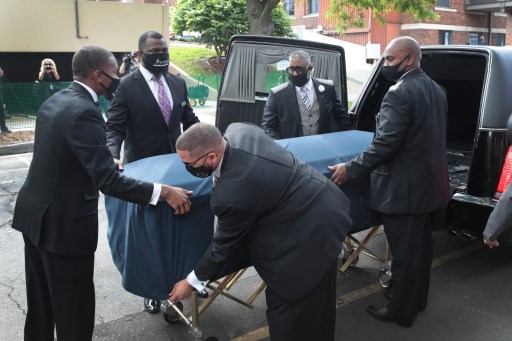New barriers were being erected outside the White House on Thursday as the protests for racial justice and police reform entered a 10th day.

The remains of George Floyd arrive at North Central University for a memorial service on June 4, 2020 in Minneapolis, Minnesota. Floyd died while in police custody on May 25, after former Minneapolis police officer Derek Chauvin kneeled on his neck for nine minutes while detaining him. His death has sparked nationwide protests and rioting. Picture: Scott Olson / Getty Images / AFP
US civil rights activist Al Sharpton was to lead a memorial service on Thursday for George Floyd, the African-American man whose harrowing videotaped death while being arrested has unleashed sweeping nationwide protests for racial justice.
“The width of the support and participation in the protests is something unlike we’ve ever seen before,” Sharpton said on MSNBC ahead of the 8pm (SA time) service. “This is the time that we can make real change.”
Three of the four Minneapolis police officers who arrested Floyd on May 25 for allegedly passing a counterfeit bill were to make their first court appearance, meanwhile, to face charges of aiding and abetting his murder.
The fourth policeman, white officer Derek Chauvin, who was filmed kneeling on Floyd’s neck for nearly nine minutes as he said “I can’t breathe,” has been charged with second-degree murder and appeared before a judge last week.
Democratic Congressman John Lewis, who marched with Martin Luther King Jr to fight segregation, echoed Sharpton’s hope that Floyd’s death and the protests could pave the way for “greater change.”
“This feels and looks so different,” the 80-year-old civil rights icon told “CBS This Morning.” “It is so much more massive and all inclusive.”
Lewis, who was brutally beaten on several occasions during the 1960s civil rights protests, condemned President Donald Trump’s threat to use military force against demonstrators.
“I think it would be a serious mistake on the part of President Trump to use the military to stop orderly, peaceful, nonviolent protests,” Lewis said. “You cannot stop, cannot stop the call of history.”
While condemning Floyd’s death, Trump has adopted a tough stance towards the protesters, saying they include many “bad people” and calling on governors to “dominate the streets.”
Trump has raised the possibility of invoking the Insurrection Act to deploy active duty troops to quell the protests but his own defense secretary, Mark Esper, said on Wednesday that should only be a “last resort.”
And Esper’s predecessor as Pentagon chief, former general James Mattis, broke his silence since resigning from the administration to deliver a biting assessment of the president.
Mattis called Trump “the first president in my lifetime who does not try to unite the American people — does not even pretend to try.”
“Instead, he tries to divide us,” the decorated Marine Corps general said.
Trump snapped back on Twitter, calling Mattis “the world’s most overrated General.”
Another Democratic congressman, Adam Schiff, the chief prosecutor at Trump’s impeachment by the House of Representatives earlier this year, drew a parallel between the US protests and Thursday’s 31st anniversary of the Chinese crackdown on students in Tiananmen Square.
“While we pause to remember the innocent lives lost and demand that the Chinese government reckon with its state-sanctioned violence, we must acknowledge that America’s moral authority to denounce these crimes relies upon our setting an example here at home,” Schiff said.
“But when our police attack peaceful protestors fighting for a more just society with tear gas, rubber bullets, and flash bang grenades, we not only violate American values, but we also we lose our credibility when advocating for human rights and democratic freedoms abroad,” he said.
New barriers were being erected outside the White House on Thursday as the protests for racial justice and police reform entered a 10th day.
Police used batons and chemical agents to clear protesters from Lafayette Park in front of the White House on Monday and have since expanded the perimeter around 1600 Pennsylvania Avenue.
Floyd’s death has reignited long-felt anger over police killings of African-Americans and unleashed a nationwide wave of civil unrest unlike any seen in the US since King’s 1968 assassination.
The arrest of all four officers involved in Floyd’s death has been a demand of the tens of thousands of protesters who have marched in the streets of dozens of US cities, often defying curfews.
Floyd’s family, in a statement thanking protesters, called the arrests and new charges a “bittersweet moment” — and a “significant step forward on the road to justice.”
They urged Americans to continue to “raise their voices for change in peaceful ways.”
Protesters staged large in cities from New York to Los Angeles on Wednesday.
Some of the protests were marred by rioting and looting in the early days but they have been mostly peaceful since then.
Los Angeles and Washington delayed the start of their curfews by several hours on Wednesday after looting and violence had subsided the previous night, while Seattle scrapped its curfew with immediate effect.
Several arrests were made in New York after groups of protesters continued to march in Manhattan and Brooklyn after the city’s 8pm curfew had passed.
A large group also protested at the US Capitol in Washington beyond curfew.
Thousands took to the streets in Hollywood and downtown Los Angeles, where Mayor Eric Garcetti vowed to redirect $250 million toward black community health and education from budgets including the police department.
For more news your way, download The Citizen’s app for iOS and Android.
Download our app




